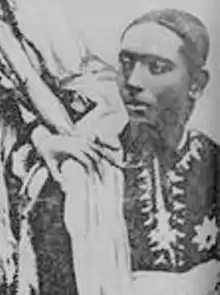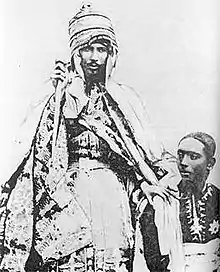Araya Selassie Yohannes
Ras Araya Selassie Yohannes (Tigrinya: አርአያ ሥላሴ ዮሐንስ, araya śəllase yohannəs; "horse name" Abba Deblaq; (1869/70 – 10 June 1888) was a son of atse Yohannes IV from his wife Masitire Selassie, a daughter of a Muslim Afar chieftain whom he married after she was Christened. Araya was nominated Crown Prince.[1]
| Araya Selassie Yohannes አርአያ ሥላሴ ዮሐንስ | |
|---|---|
| King of Tigray, Wollo, Begembder and Dembiya | |
 | |
| Reign | 1872-1888 |
| Successor | Gugsa Araya Selassie |
| Born | 1869/70 Enderta, Tigray, Ethiopia |
| Died | 10 June 1888 Mekelle, Tigray, Ethiopia |
| Burial | Medhane Alem Church, Mekelle |
| Spouse | Leult Zewditu Emet Negest Sendek |
| Issue | Gugsa Araya Selassie |
| House | Solomonic Dynasty (Tigrayan Branch) |
| Father | Emperor Yohannes IV |
| Religion | Ethiopian Orthodox Tewahedo |
Araya was the first husband of Zewditu (later Empress), the daughter of atse Menelik II, having married her in January 1883. He was given the command of Wollo province at the time of his wedding. Because of a revolt raised in Wollo due to the death of dejazmach Amda Sadiq, chief of Tekaledere, in a quarrel with Araya's followers, Yohannes IV decided to appoint ras Mikael Ali, the traditional claimant to the lordship of Wollo.[2] Ras Araya was transferred to Begemder and Dembaya in May 1886. In 1887–88, when the country was facing the Italian threat, he was commander of 40,000 troops near Adwa.
Araya died in his youth from smallpox, when the Emperor was returning from a campaign against the Italians at Seati (Battle of Dogali) His only son, by a weyzero Negesit, a lady from Wollo, was leul ras Gugsa Araya.[3]
Biography
Early life
Leul[nb 1] Araya Selassie Yohannes was born in Enderta, a part of Tigray in Ethiopia in 1869/70, the legitimate son of Emperor (Nəgusä Nägäst)[nb 2] Yohannes IV of Ethiopia. Mengesha Yohannes was his illegitimate half brother. He was granted the title of Ras in 1872 and was the governor of Enderta from 1872 to 1882.[4]
Rise to Power

On 24 October 1882, the fifteen-year-old Leul Araya Selassie Yohannes married six-year-old Leult[nb 3] Zewditu, eldest daughter of Negus[nb 4] Menelik of Shewa. The marriage was political, having been arranged when Menelik agreed to submit to Yohannes' rule. In 1882 Ras Araya was granted the title of Negus of Tigray and Wollo. In 1883, Araya Selassie Yohannes was made Shum[nb 5] of Wollo Province[5] and, in 1886, he was made Shum of Begemder and Dembiya.
In 1885, Araya Selassie Yohannes fathered a son, Gugsa Araya Selassie. The mother's identity is unknown.
Honors
![]() Grand Collar of the Order of the Seal of Solomon (1875)
Grand Collar of the Order of the Seal of Solomon (1875)
Legacy
Familial rivalry between the two lines of descent from Emperor Yohannes IV proved to be a difficult issue for Emperor Menelik II and his successors. Tigray Province was divided between Ras Gugsa Araya Selassie, the son of Ras Araya Selassie Yohannes, and Ras Seyum Mangasha, the son of Ras Mangasha Yohannes. Gugsa Araya Selassie ruled the eastern half of Tigray and Seyum Mangasha ruled the western half.
See also
- Monarchies of Ethiopia
- Ethiopian aristocratic and court titles
- Mangasha Yohannes - Half brother of Araya Selassie Yohannes
Notes
- Footnotes
- Roughly equivalent to Prince.
- Roughly equivalent to King of Kings.
- Roughly equivalent to Princess.
- Roughly equivalent to King.
- Roughly equivalent to Governor.
- Citations
- Gebre-Selassie, Zewde (2003). "Araya Selassie Yohannes". Encyclopaedia Aethiopica. 1. Wiesbaden: Harrassowitz Verlag. p. 314.
- Tafla, Bairu (1977). A Chronicle of Emperor Yohannes IV. Wiesbaden. p. 155.
- Gebre-Selassie, Zewde (1975). Yohannes IV of Ethiopia: a Political Biography. Oxford. p. 247.
- Shinn, Historical dictionary of Ethiopia, p.35
- Marcus, A History of Ethiopia, p. 80
References
- Marcus, Harold G. (1994). A History of Ethiopia. London: University of California Press. pp. 316. ISBN 0-520-22479-5.
- Mockler, Anthony (2002). Haile Sellassie's War. New York: Olive Branch Press. ISBN 978-1-56656-473-1.
- Shinn, David Hamilton, Ofcansky, Thomas P., and Prouty, Chris (2004). Historical dictionary of Ethiopia. Lanham, Maryland: Scarecrow Press. p. 633. ISBN 0-8108-4910-0.